|
I can recall from a very young age pondering what it means to be Catholic. We were supposed to somehow be different from secular society by the way we lived our lives, but how or why was that any different than simply being a good, kind, and moral human being? Can “normal” domestic life be holy? Why is the domestic church—the Christian family—so vitally important to our faith? Throughout my life, this question has been answered in various ways and degrees. However, nothing has been so powerful as what I have witnessed in the past few months. In the late fall of last year, my mother-in-law underwent unexpected surgery and was unable to attend Mass. During our family’s Thanksgiving visits, I witnessed an incredible moment of our faith: my mother was able to distribute the Sacred Body of our Lord to my mother-in-law. Tears fell from my mother-in-law’s eyes as my husband, father, mother, and I encircled her, reciting prayers together in preparation for the distribution of the Eucharist. I was struck by the immensity of this moment: as I witnessed the woman who gave me life distribute the source of eternal life to the woman who gave my husband life, the depth and vital importance of the domestic church began to come into clearer focus for me. The Christmas season would bring me another unexpected intersection of family and faith and another reminder of the significance of the domestic church. My father was hospitalized between Christmas and New Year’s; I found myself once again in the midst of a family circle of prayer as this time I witnessed my sister ministering the Sacred Body of our Lord to both my father and mother. My husband, nieces, nephew, brother-in-law, and I encircled my father’s hospital bed. Again, I found myself struck by the immensity of the moment unraveling before me; there is something very profound in witnessing the physical, tangible presence of Christ enter into vulnerable family space. I held these moments in my heart and in my mind, reflecting on them as the days rolled by between the holidays and the beginning of Lent. This year, our parish announced that they are encouraging families to consecrate themselves to the Holy Family. Ah, the Holy Family, the perfect model of the domestic church! It is within the context of the family that we learn about our faith and see examples of faith lived out. Christ Himself was born into a family; it was a vital part of his plan of salvation. We are each called to sainthood and each of our paths to sainthood will look a bit different. Lent is a beautiful time to really evaluate how close we are to following that path and what we can do in our lives to stay the course. No matter what path our calling leads us on, all paths lead back to the family—whether that be our own family by blood or our brothers and sisters in the faith. How do we live out each day as a domestic church and bring that holy reverence to our everyday lives? We are called not only to love one another but to LIVE for one another. I witnessed this profoundly over the holidays when I saw different members of my family live for and serve one another. But there are also opportunities being presented throughout our everyday life to grow in holiness and spiritual maturity—especially now during this Lenten season. Lent is not only a time to deny ourselves of those things that keep us from our path to sainthood but also a time to invite the Holy Spirit to open our eyes and hearts to opportunities of everyday holiness and saintly domesticity. Christ wants to be a living presence in our homes and in our families, but we have to open the door for Him and invite Him in. I saw the effects of Christ’s presence in my family in those moments when He was brought physically to my parents and mother-in-law. Christ brings unity, service, strength, love. Just as in our physical lives we can manage the stresses and craziness of ever day life better when we fuel our body with proper nutrition and exercise, so too are we called to fuel our spirits and our family bonds with the Bread of the angels and on every word that comes forth from the mouth of God. What spiritual exercises can we work through together as a family this Lenten season? How can we work to call one another to a life of saintly domesticity? For more resources to accompany you throughout your Lenten journey, please click here. To learn more about Marriage and Family, please click here.
0 Comments
As a nation, we celebrate Martin Luther King, Jr. Day on January 21st. Does this mean anything special for the Church—for Catholics, even? Catholics have much to learn and celebrate about the Baptist pastor, preacher, and prophet. The more we consider how far we have come as a nation and as a human race since Dr. King met his tragic end on April 4, 1968, the more we sense, I think, just how far we have to go to realize his Dream. When I think of Dr. King, I think of justice. Biblical justice. To recall a famous quote (King’s paraphrase from Theodore Parker), “The arc of the moral universe is long, but it bends toward justice.” As our nation honors Dr. King in a few days, I think it might be wise to contemplate for a moment the role of justice in our discipleship, which is an integral aspect of our baptismal identity as priest, prophet, and king. As a pastor and preacher, Martin Luther King, Jr. understood deep in his bones the kerygmatic nature (from “kerygma”) of true justice. Justice is a gift of Jesus. Like all gifts and graces from God, it is meant to be multiplied and shared. Even in the most difficult times of persecution, Dr. King proclaimed the gift of justice. In his famous “Letter From Birmingham Jail,” Dr. King wrote the words, “Injustice anywhere is a threat to justice everywhere.” Dr. King (who earned a Ph.D. in Philosophy from Boston University) quotes St. Thomas Aquinas in defining an unjust law as “a human law that is not rooted in eternal and natural law,” and then adds a simple explanation: “Any law that uplifts human personality is just. Any law that degrades human personality is unjust.” St. Thomas Aquinas (1225-1774), the great theologian of the Middle Ages and among the greatest in the history of the Church, defined justice as giving the other what is their due. Thomas Aquinas even defines “religion,” which is a virtue, as a form of justice, because it gives God the worship and adoration that is owed to him. First, can we ask ourselves where justice is still lacking in our world and in our own Church insofar as it is, alongside its spiritual identity, an institution composed of fallible, sinful human beings? Any lack of justice is a sure sign that we, the Church, have become adept in talking about the Gospel but have yet to take living it just as seriously. In her ongoing task of renewal, the Church must recover a robustly biblical, prophetic vision and conviction that justice is not accessory to the Gospel. Fortunately, in my own observations and ministry, I have seen that many young Christians are mending the gap that seems to have developed between “social justice Christians” and “liturgy and doctrine Christians.” This distinction is foreign to Aquinas and King, and the extent to which we buy into this split is the sign that we have allowed our faith to be compromised by the politics of the day. To offer one way of restoring this divide, in his letter Dr. King writes, “We are caught in an inescapable network of mutuality, tied in a single garment of destiny.” What if we thought about our baptismal garment, symbolic of putting on the life of Christ, as also the Church’s “garment of destiny”? Salvation and justice are the garment that clothes the body of Christ, the Church. One way of looking at Dr. King’s quote about the moral arc is to see it as a challenge that is not “way out there” in the universe, but as an invitation to bend and mend our personal lives toward justice. What might it imply to bend our lives? A change of habit or lifestyle, resisting our initial unkind or selfish response or natural inclination, and going out of our way to change the trajectory of our relationship with other people, our nation, and even creation. This is the message of “integral ecology” Pope Francis teaches in his encyclical letter Laudato Si. Dr. King saw God’s providential hand at work on a cosmic level, and as Catholics, we recognize the need as disciples to participate in God’s grace, and that includes justice. Authentic justice takes work, effort, struggle, and at times—as many true prophets in Scripture and history have experienced—persecution. Not all of us are called to create justice in the same way, yet we are all called to create justice in some way. Question for Reflection: What is one concrete step you can take to help create a more just situation in your family, school, workplace, or other sphere of influence today? To learn more about Catholic Social Teaching, please click here. When I was in 8th grade, I helped teach for my parish’s religious education program and counted the hours toward my required community service time before receiving the Sacrament of Confirmation. I was an assistant for the 5th grade, and I thought it was the coolest thing. I could share with the class what I knew about the Church, even teaching them at one point how to pray the Rosary. Looking back, it seems like I was destined to teach in a Catholic school! After college, I began working at my current school in the Archdiocese of Washington (ADW), where I continue to teach and share my faith with the students. To this day, I continue to teach religion. I strive to form my students as disciples according to six elements of Catholic life: Knowledge of the Faith, Liturgy and Sacraments, Morality, Prayer, Education for Living in Christian Community, and Evangelization and Apostolic Life.
For catechists who actively pass on the Word of God to others, teaching the faith can become almost second nature. For instance, at my school, we incorporate core Jesuit principles into the curriculum each day and reflect on our own actions through prayer. In my pre-K classroom, we use these principles to talk about kindness and loving others as St. Ignatius taught. In a special way, my students are learning how to be good friends and love others the way Jesus did. In the Archdiocese of Washington (ADW), the religious curriculum has standards by which its content is measured and assessed—like any other subject area in school. In fact, ADW is trying to support catechists to do more to collaborate and keep kids engaged and excited about learning their faith. Professional development of catechists is crucial to a school, parish, or community. Learning how to be better witnesses of the faith ensures that our children are receiving the best formation of conscience they can get. Although there are people certified and educated to teach as catechists, most of us are already fulfilling that duty as faith-filled adults in the Church who witness to and spread the Gospel. Below is a list I have compiled of a description of a catechist. After reading it, do you feel called to become one?
For more information, we invite you to view the following webinar at the bottom of the page:
Question for Reflection: How can you teach the faith to others in your everyday life? *This post was originally published in May 2017* 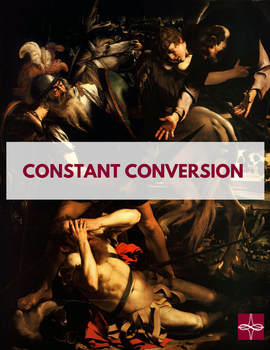 The story of St. Paul has always been one that has touched me to my very core. To think that someone who was persecuting the Church—who saw to it that the very first martyr, Stephen, was stoned to death—would eventually leave everything to follow God’s will for his life is truly extraordinary. But the story of St. Paul, although extraordinary, is not something beyond our reach. Some of us have experienced massive conversions in our lives—whether they involve entering the Church for the first time or returning to the sacraments after a time away. Some of us have had conversions of mind and heart when it comes to embracing what the Church teaches in regards to morality. Still others experience ongoing, undramatic conversion throughout their lives. Regardless of our individual experiences, the conversion of St. Paul can inspire us to encounter Christ in a deeper way that leaves us transformed. The Church does not celebrate the feast of the conversion of St. Paul merely for that moment of initial encounter and conversion. We celebrate it because of how it changed absolutely everything for Saul, now Paul. Paul met Christ personally; and this encounter guided his decisions and actions for the rest of his life. And so it must be with us! Shortly after Paul’s conversion on the road to Damascus, Acts 9:18 describes how after a conversation with Ananias, “things like scales fell from his eyes.” It was only after this that Paul was able to go and preach the good news of the Gospel—the good news that changed everything for him. Although we may not be knocked blind by a voice in the heavens, most of us do have scales on our eyes that prevent us from truly seeing and knowing Christ and spreading the Gospel. Whether we experience scales of sin, shame, bitterness, or inadequacy, we must remember that God desires constant conversion for us. Just as He so faithfully spoke to Paul in his conversion, He is inviting us to the same thing—the promise that a life turned toward Him will be better than anything our clouded eyes could imagine. This will manifest itself in our lives in any number of ways—through reconciliation in a relationship, returning to confession, or an increased disposition of mercy for those in our lives who need it. By allowing our lives to be constantly converted, we will be equipped, encouraged, and enabled to share the news that changed everything for Paul 2000 years ago and that continues to change everything for us now. Let us pray and ask the Lord for a deeper encounter with him. May he continually remove the scales from our eyes. St. Paul, pray for us! Questions for Reflection: Have you experienced a powerful moment of conversion or has your spiritual life been one of ongoing, gradual conversion? What might be some “scales” in your life that prevent you from living as a missionary disciple? When I was in 8th grade, I helped teach for my parish’s religious education program and counted the hours toward my required community service time before receiving the Sacrament of Confirmation. I was an assistant for the 5th grade, and I thought it was the coolest thing. I could share with the class what I knew about the Church, even teaching them at one point how to pray the Rosary. Looking back, it seems like I was destined to teach in a Catholic school! After college, I began working at my current school in the Archdiocese of Washington (ADW), where I continue to teach and share my faith with the students. To this day, I continue to teach religion. I strive to form my students as disciples according to six elements of Catholic life: Knowledge of the Faith, Liturgy and Sacraments, Morality, Prayer, Education for Living in Christian Community, and Evangelization and Apostolic Life.
For catechists who actively pass on the Word of God to others, teaching the faith can become almost second nature. For instance, at my school, we incorporate core Jesuit principles into the curriculum each day and reflect on our own actions through prayer. In my pre-K classroom, we use these principles to talk about kindness and loving others as St. Ignatius taught. In a special way, my students are learning how to be good friends and love others the way Jesus did. In the Archdiocese of Washington (ADW), the religious curriculum has standards by which its content is measured and assessed—like any other subject area in school. In fact, ADW is trying to support catechists to do more to collaborate and keep kids engaged and excited about learning their faith. Professional development of catechists is crucial to a school, parish, or community. Learning how to be better witnesses of the faith ensures that our children are receiving the best formation of conscience they can get. Although there are people certified and educated to teach as catechists, most of us are already fulfilling that duty as faith-filled adults in the Church who witness to and spread the Gospel. Below is a list I have compiled of a description of a catechist. After reading it, do you feel called to become one?
For more information, we invite you to view the following webinar at the bottom of the page:
Question for Reflection: How can you teach the faith to others in your everyday life? When I was in 8th grade, I helped teach for my parish’s religious education program and counted the hours toward my required community service time before receiving the Sacrament of Confirmation. I was an assistant for the 5th grade, and I thought it was the coolest thing. I could share with the class what I knew about the Church, even teaching them at one point how to pray the Rosary. Looking back, it seems like I was destined to teach in a Catholic school! After college, I began working at my current school in the Archdiocese of Washington (ADW), where I continue to teach and share my faith with the students. To this day, I continue to teach religion. I strive to form my students as disciples according to six elements of Catholic life: Knowledge of the Faith, Liturgy and Sacraments, Morality, Prayer, Education for Living in Christian Community, and Evangelization and Apostolic Life.
For catechists who actively pass on the Word of God to others, teaching the faith can become almost second nature. For instance, at my school, we incorporate core Jesuit principles into the curriculum each day and reflect on our own actions through prayer. In my pre-K classroom, we use these principles to talk about kindness and loving others as St. Ignatius taught. In a special way, my students are learning how to be good friends and love others the way Jesus did. In the Archdiocese of Washington (ADW), the religious curriculum has standards by which its content is measured and assessed—like any other subject area in school. In fact, ADW is trying to support catechists to do more to collaborate and keep kids engaged and excited about learning their faith. Professional development of catechists is crucial to a school, parish, or community. Learning how to be better witnesses of the faith ensures that our children are receiving the best formation of conscience they can get. Although there are people certified and educated to teach as catechists, most of us are already fulfilling that duty as faith-filled adults in the Church who witness to and spread the Gospel. Below is a list I have compiled of a description of a catechist. After reading it, do you feel called to become one?
For more information, we invite you to view the following webinar at the bottom of the page:
Question for Reflection: How can you teach the faith to others in your everyday life? Until recently, I had this perception that to serve God in a day job, someone had to work directly in religious life or work as a missionary. I thoroughly enjoy my day job in communications, but couldn’t help wondering if what I was doing ultimately served God. I searched the Internet for ways to see God in the day-to-day struggles of work-life balance. Through my search and prayer, I realized that working in an ethical environment that fit with my morals and values was the first step to seeing how my work served God. After reflection, I also saw how the words I used and the promotional or informative materials I designed inspired and educated others. God gives us all unique talents to grow and develop, as mentioned in The Parable of the Talents in Matthew. I believe my communications role allows me to strengthen my gifts in thinking creatively and working quickly and efficiently, while helping me to be a positive voice in my work environment. Here are some inspirational points I keep in mind while working in a nine-to-five career. 1. “Work becomes worship when you dedicate it to God and perform it with an awareness of his presence.” –Rick Warren, The Purpose Driven Life A secular view removes God from our work. However, God wants to be a part of our work. He calls us to use our unique talents for others. This helps to reveal to us why we are important and what we are called to do. We can each bring honor and glory to God in our own way by using these unique talents in whatever work we do. Some ideas:
2. “Slaves, be obedient…as to Christ, not only when being watched, as currying favor, but as slaves of Christ, doing the will of God from the heart, willingly serving the Lord and not human beings, knowing that each will be requited from the Lord for whatever good he does, whether he is slave or free.” – Ephesians 6:5-8 Regardless of the type of work we do, God is our ultimate employer. Following God’s plan for our work is what gives it legitimacy. Just as Adam and Eve were given the task of taking care of God’s creation before they sinned, so too were we created to do God’s work of maintaining and providing for His creation. It’s important to remain ethical in our daily tasks. When we are tempted to gossip, be grumpy, or give into peer pressure, we must remind ourselves that God calls us to act above those enticements. 3. “Those to whom God gives riches and property, and grants power to partake of them, so that they receive their lot and find joy in the fruits of their toil: This is a gift from God. For they will hardly dwell on the shortness of life, because God lets them busy themselves with the joy of their heart.” – Ecclesiastes 5:18-19 Serving God in our work completely depends on our attitude. We are called to be joyful in our work. This is made easier when we remember that we are ultimately serving others through our work. If there’s a menial or stressful task ahead, think of the people who benefit from your service. 4. “I am the vine, you are the branches. Whoever remains in me and I in him will bear much fruit, because without me you can do nothing.” – John 15:5 God wants to be invited into every area of our lives, and much of our lives are spent doing work. Though we may attain monetary success or be productive in the workplace, if our work does not have God as its foundation, it is stripped of its transcendent meaning. Including God in our daily lives is a sign of humility. Try asking for God’s help throughout the day or during an important meeting or project. 5. “In every way I have shown you that by hard work of that sort we must help the weak, and keep in mind the words of the Lord Jesus who himself said, ‘It is more blessed to give than to receive.’” – Acts 20:35 While we work to earn a living and provide for our families, we are also called to be generous to our neighbors in need. After all, it is because of God’s blessings that we have the ability to take care of ourselves. We are, again, called to take care of all God’s creation. Some ways we can take care of God’s creation include: • Reflecting on what your God-given talents are, and seeking ways to put your talents to work by serving your community. • Seeking to respect life in all forms – the environment, human life from conception to natural death, and other living animals. • Finding ways to live simply and not be wasteful; recycle. • Offering to help others in your office – if a coworker is on a tight deadline, ask them how you can assist in your role. • Saving a portion of your monthly budget for charity, including church tithing. You never know when a service opportunity presents itself – and now, you’ll have a budget you can pull from! Why have I lost contact with my good friend from school?
A few weeks ago, a friend and I were discussing how friendships can wax and wane, and from that conversation came the topic of marriage and dating. My friend recommended the book, “Men, Women and the Mystery of Love: Practical Insights from John Paul II’s Love and Responsibility.” The first chapter focused on three kinds of friendship, which I wanted to share since it applies to every person we interact with daily. According to John Paul II’s personalist principle, “…a person must not be merely the means to an end for another person” (9). Meaning, we shouldn’t treat people as just a way for us to achieve our own purposes. Once we begin to use the people in our lives as objects for our own purposes or enjoyment, we do “violence to the very essence of the other” (9). Why do we not commit when a friend asks if we want to hang out later in the week? We want to be available in case something more enjoyable comes later, so we don’t give our friend a definitive “yes” or “no”. We keep this friend as a “back up,” which is both hurtful to our friend and harmful to our relationship with them. Once this utilitarian attitude is adopted, we reduce the people in our lives to an object for our enjoyment. There is no foundation for a relationship if we are only with friends as long as they are advantageous to us in some way (12). Aristotle stated there are three kinds of friendship based on three different types of affection that bonds people. The first friendship is of utility. Friendship is based on benefit or quid pro quo. Many work relationships tend to be in this category. The second friendship is pleasantness, where friendship is based on the amount of pleasure gained from the relationship. The friend is the cause of some pleasure to us, and is mostly about having fun together. Aristotle says these two types of friendships do not represent friendship to its fullest because when usefulness or good times leave (such as coworkers or friends moving) the friendship often ends (13). The third form of friendship is virtuous. Two friends are united in the pursuit of a common goal for a moral, good life, and not self-interest. In a virtuous friendship, the individuals are committed to pursing something that goes beyond their own self-interests. This friendship is more concerned about what is best for the other person in pursuing a virtuous life. John Paul II says, “the only way two human persons can avoid using each other is to relate in pursuit of a common good” (15). In our friendships and relationships, it is tempting to want others to do as we ask, conforming to our plans, schedules, preferences, and desires. For example, a friend may ask us to look over an application for a job, but we would rather watch TV. John Paul II states that, “when two different people consciously choose a common aim his puts them on a footing of equality, and preludes the possibility that one of them might be subordinated to the other” (16-17). In this “do what you want, when you want it” culture, I’ve caught myself in the spirit of utilitarianism, particularly when I am stressed or very busy. I’ve also found myself on the receiving end of someone in the spirit of utilitarianism, and it’s often led to the friendship not lasting. How have you noticed or even experienced the spirit of utilitarianism in relationships? I’ve been fortunate enough to have a few truly virtuous friendships. There are a few college friends where I cannot go too long without catching up over Skype, text, and phone calls. I find that we share catch up time equally, constantly asking each other questions instead of self-centered updates devoid of inquiry for the other person’s life. We share struggles and achievements of our spiritual life as well as obstacles we face. We pick up right where we left off and it’s like we’d just seen each other yesterday. Have you experienced a virtuous friendship? What made it different from other relationships that were “useful” or “pleasant”? As one last final thought, imagine a world where each of us treated everyone we encounter by using the personalist principle. Imagine how much more of a caring and virtuous environment we’d live in. While it is a struggle, we can strive for this each day. Dana Edwards is a recent graduate of the University of Florida. She currently resides in Tallahassee, Florida where she works as a Digital Strategist, and volunteers as a lector and with communication outreach at her local parish, Good Shepherd Catholic Church. “I was dazzled by a girl I met… I was struck by her beauty, her spirit. I was bowled over for quite a while, she made my head spin.”
Yes, even Pope Francis has experienced falling in love. Much more than just hormones, neurochemicals, emotions, or a pyscho-physical state, love is an ongoing relationship between two people. It is stable, yet grows and is lasting; it offers affection, support, help, and hope (cf. 1 Corinthians 13). If a relationship is not rooted in this love, how can it last? Just as God’s love is total and without end, so must be the love upon which a family is based. In a world where too many settle for an empty version of love and the family unit is under attacksuffering difficulty, it becomes critical that we remember the sacredness of the sacrament of marriage and its purpose as instituted by God. God’s first command to Adam and Eve was to “be fruitful and multiply” (Genesis 1:28). He had not joined our first parents solely for their own benefit or pleasure. Their every act in God’s new creation was to glory and praise Him. Similarly, a man and a woman do not enter into a marriage for their own happiness, but to “love and honor” each other “in good times and in bad… all the days of [their] life.” The couple reflects God’s bearing fruit in their lives, a continuous sign of God’s Power in the world. Everything they do, be it chores, budgeting, cooking, or relaxing, whether separately or together, is a living out of their sacrament— even the smallest acts in the life of a married couple have power hidden within them to make them holy. As married life is the ground of holiness, love is the seed planted by God. Life, together with its agonies and joys, pain and sacrifices, frustrations and tensions, moments of exultation and despair, all act as the rain and sun, thunder and lightning on a young sprout. Of course, disagreements are a normal part of the married lifestyle as well as the human condition. No one is perfect but the faults and weaknesses of each one are compensated for by the other’s virtues. Each possesses what the other lacks. Rather than causing a rift between the two, this results in a loving dependence on each other for spiritual growth and transformation. By forming a habit of looking at each other in a sacramental way— seeing the beauty of God in each other’s souls and seeking to enhance that beauty by building up each other— a married couple reflects God’s blessings and love. The Catechism of the Catholic Church acknowledges this by making no distinction between the roles of the man and woman in the family (see CCC 2221-2231). Rather, both are called to provide the good example and instruction of both academic reason and moral and spiritual formation to their offspring, who in turn contribute to the growth in holiness of the parents (see CCC 2227). Being married to one another, the man and his wife are entrusted with the welfare of the family— woe to those who neglect this responsibility (see 1 Timothy 5:8)! The purpose of raising of a family is not to give glory to oneself but to selflessly assist each other in reaching the Kingdom of God. This is no easy task, as it is a great challenge to devote one’s life to those around him/her! To do this requires great love, the strongest bonding force, and we are reminded of this in a reading commonly used in weddings: Husbands, love your wives, just as Christ also loved the church and gave Himself up for her, so that He might sanctify her, having cleansed her by the washing of water with the word, that He might present to Himself the church in all her glory, having no spot or wrinkle or any such thing; but that she would be holy and blameless. So husbands ought also to love their own wives as their own bodies. He who loves his own wife loves himself; for no one ever hated his own flesh, but nourishes and cherishes it, just as Christ also does the church, because we are members of His body. “For this reason a man shall leave his father and mother and shall be joined to his wife, and the two shall become one flesh.” This mystery is great; but I am speaking with reference to Christ and the church. Nevertheless, each individual among you also is to love his own wife even as himself, and the wife must see to it that she respects her husband. (Ephesians 5:25-33) Finally, Matrimony responds to a specific vocation and must be remembered as sacred. It is a consecration: the man and woman are consecrated in their love. The spouses, then, are entrusted with a mission, so that by starting with the simple ordinary things of life they may make visible and known the love with which Christ loves His Church— that is continuing to give His life for her in fidelity and service. In spite of the difficulties experienced by married couples, the important thing to remember is the nurturing of their bond with God, Who is the foundation of and the cause of joy in the marital bond. Pope Francis, though he ultimately gave himself to the ultimate Spouse, offers these words of advice for preserving “what God has joined, [and] men must not divide”: There are three words that always need to be said, three words that need to be said at home: may I, thank you, and sorry. The three magic words. May I: so as not to be intrusive in the life of the spouses. May I, but how does it seem to you? May I, please allow me. Thank you: to thank one’s spouse; thank you for what you did for me, thank you for this. That beauty of giving thanks! And since we all make mistakes, that other word which is a bit hard to say but which needs to be said: sorry. Please, thank you, and sorry. With these three words, with the prayer of the husband for the wife and vice versa, by always making peace before the day comes to an end, marriage will go forward. The three magic words, prayer and always making peace. Thomas Wong is an undergraduate at The Catholic University of America in Washington, D.C. A major contention that many people – both young and old – have with the Church is that it is an institution of “Thou Shalt Nots” and other moral imperatives that have little or no relevance in the modern world. In essence, the Church is seen as little more than an outdated social services agency, or even worse, a dismal and ahistorical museum perpetuating a false sense of reality. This emerging perception of the Church parallels a larger cultural shift from the acceptance of objective truth toward a secular relativism.
In a recent address to a group of U.S. bishops in Rome for their ad limina visit, Pope Benedict XVI proposed that the Church’s response to this “eroded” perception of reality is one of the greatest “spiritual and cultural challenges of the new evangelization.” Because of the Catholic Apostolate Center’s commitment to being an instrument of the new evangelization, this bears much significance on the direction of our work. But what impact does – or should – this emerging situation have on our daily lives? In the words of the Holy Father, “the Church in the United States is called, in season and out of season, to proclaim a Gospel which not only proposes unchanging moral truths but proposes them precisely as the key to human happiness and social prospering”. As Catholics, we are called to uphold the perceptive vision of reality that has been gifted to us by the Holy Spirit through Divine Revelation. It is only through upholding this vision that we can ever hope to accurately understand our place in the world around us and “the deepest truth about our being and ultimate vocation, our relationship to God.” As Catholics, we are beneficiaries of an astonishing intellectual legacy that was developed over the course of two millennia by scholars who examined these mysteries through the complimentary lenses of faith and reason. Contrary to popular opinion, the Church’s moral teaching is not merely a hodge-podge of archaic prohibitions, but a doctrine that is congruent with the logical nature of reality and informed by Divine Revelation. As the Pope explained in his address, the moral teaching of the Church “is not a threat to our freedom, but rather a ‘language’ which enables us to understand ourselves and the truth of our being, and so to shape a more just and humane world. She thus proposes her moral teaching as a message not of constraint but of liberation, and as the basis for building a secure future.” If we are to succeed in being apostles of the New Evangelization, then one of our most critical objectives should be to proclaim the beauty, consistency, and relevance of the Church’s moral teaching, without which we would be left with an incomplete view of our own humanity. Informed by this teaching, it is also important that we serve as prophets in the public sphere of these truths. As Pope Benedict XVI emphasized, “it is imperative that the entire Catholic community in the United States come to realize the grave threats to the Church’s public moral witness presented by a radical secularism which finds increasing expression in the political and cultural spheres.” Even more pertinent to the work of the Catholic Apostolate Center, the Holy Father went on to say that “the preparation of committed lay leaders and the presentation of a convincing articulation of the Christian vision of man and society remain a primary task of the Church in your country; as essential components of the new evangelization, these concerns must shape the vision and goals of catechetical programs at every level.” Blessed John XXIII was once quoted as saying the following: “We are not on earth to guard a museum, but to cultivate a flourishing garden of life.” The New Evangelization is not concerned with re-presenting a forgotten memory from the past, but with re-proposing the living and eternal truth of Jesus Christ that continues to sustain His Church. The Church’s moral teaching is just one part of this truth, but as the Holy Father makes clear, it is an essential part to humanity’s self-understanding. Brett Garland is a Collaborator with the Catholic Apostolate Center. Audio of the Holy Father’s address available here. CNS Report about the Holy Father's address. Editor's Note: This post was originally published in 2012. A major contention that many people – both young and old – have with the Church is that it is an institution of “Thou Shalt Nots” and other moral imperatives that have little or no relevance in the modern world. In essence, the Church is seen as little more than an outdated social services agency, or even worse, a dismal and ahistorical museum perpetuating a false sense of reality. This emerging perception of the Church parallels a larger cultural shift from the acceptance of objective truth toward a secular relativism.
In an address given in 2012 to a group of U.S. bishops in Rome for their ad limina visit, Pope Benedict XVI proposed that the Church’s response to this “eroded” perception of reality is one of the greatest “spiritual and cultural challenges of the new evangelization.” Because of the Catholic Apostolate Center’s commitment to being an instrument of the new evangelization, this bears much significance on the direction of our work. But what impact does – or should – this emerging situation have on our daily lives? In the words of the Holy Father, “the Church in the United States is called, in season and out of season, to proclaim a Gospel which not only proposes unchanging moral truths but proposes them precisely as the key to human happiness and social prospering”. As Catholics, we are called to uphold the perceptive vision of reality that has been gifted to us by the Holy Spirit through Divine Revelation. It is only through upholding this vision that we can ever hope to accurately understand our place in the world around us and “the deepest truth about our being and ultimate vocation, our relationship to God.” As Catholics, we are beneficiaries of an astonishing intellectual legacy that was developed over the course of two millennia by scholars who examined these mysteries through the complimentary lenses of faith and reason. Contrary to popular opinion, the Church’s moral teaching is not merely a hodge-podge of archaic prohibitions, but a doctrine that is congruent with the logical nature of reality and informed by Divine Revelation. As the Pope explained in his address, the moral teaching of the Church “is not a threat to our freedom, but rather a ‘language’ which enables us to understand ourselves and the truth of our being, and so to shape a more just and humane world. She thus proposes her moral teaching as a message not of constraint but of liberation, and as the basis for building a secure future.” If we are to succeed in being apostles of the New Evangelization, then one of our most critical objectives should be to proclaim the beauty, consistency, and relevance of the Church’s moral teaching, without which we would be left with an incomplete view of our own humanity. Informed by this teaching, it is also important that we serve as prophets in the public sphere of these truths. As Pope Benedict XVI emphasized, “it is imperative that the entire Catholic community in the United States come to realize the grave threats to the Church’s public moral witness presented by a radical secularism which finds increasing expression in the political and cultural spheres.” Even more pertinent to the work of the Catholic Apostolate Center, the Holy Father went on to say that “the preparation of committed lay leaders and the presentation of a convincing articulation of the Christian vision of man and society remain a primary task of the Church in your country; as essential components of the new evangelization, these concerns must shape the vision and goals of catechetical programs at every level.” Blessed John XXIII was once quoted as saying the following: “We are not on earth to guard a museum, but to cultivate a flourishing garden of life.” The New Evangelization is not concerned with re-presenting a forgotten memory from the past, but with re-proposing the living and eternal truth of Jesus Christ that continues to sustain His Church. The Church’s moral teaching is just one part of this truth, but as the Holy Father makes clear, it is an essential part to humanity’s self-understanding. Brett Garland is a Collaborator with the Catholic Apostolate Center. Audio of the Holy Father’s address available here. CNS Report about the Holy Father's address. Editor's Note: This Post was originally published on January 21, 2012 As we celebrate Independence Day, a day of thanksgiving and gratitude for this great country we live in, let us be reminded of our first American Saint, Elizabeth Ann Seton and the work she did to bring liberty and justice to all! The following is the Homily of the Pope Paul VI on the Canonization of Elizabeth Ann Seton, with emphasis added.  Yes, Venerable Brothers and beloved sons and daughters! Elizabeth Ann Seton is a Saint! We rejoice and we are deeply moved that our apostolic ministry authorizes us to make this solemn declaration before all of you here present, before the holy Catholic Church, before our other Christian brethren in the world, before the entire American people, and before all humanity. Elizabeth Ann Bayley Seton is a Saint! She is the first daughter of the United States of America to be glorified with this incomparable attribute! But what do we mean when we say: "She is a Saint"? We all have some idea of the meaning of this highest title; but it is still difficult for us to make an exact analysis of it. Being a Saint means being perfect, with a perfection that attains the highest level that a human being can reach. A Saint is a human creature fully conformed to the will of God. A Saint is a person in whom all sin-the principle of death-is cancelled out and replaced by the living splendor of divine grace. The analysis of the concept of sanctity brings us to recognize in a soul the mingling of two elements that are entirely different but which come together to produce a single effect: sanctity. One of these elements is the human and moral element, raised to the degree of heroism: heroic virtues are always required by the Church for the recognition of a person's sanctity. The second element is the mystical element, which express the measure and form of divine action in the person chosen by God to realize in herself-always in an original way-the image of Christ (Cfr.Rom. 8, 29). The science of sanctity is therefore the most interesting, the most varied, the most surprising and the most fascinating of all the studies of that ever mysterious being which is man. The Church has made this study of the life, that is, the interior and exterior history, of Elizabeth Ann Seton. And the Church has exulted with admiration and joy, and has today heard her own charism of truth poured out in the exclamation that we send up to God and announce to the world: She is a Saint! We shall not now give a panegyric, that is, the narrative which glorifies the new Saint. You already know her life and you will certainly study it further. This will be one of the most valuable fruits of the Canonization of the new Saint: to know her, in order to admire in her an outstanding human figure; in order to praise God who is wonderful in his saints; to imitate her example which this ceremony places in a light that will give perennial edification; to invoke her protection, now that we have the certitude of her participation in the exchange of heavenly life in the Mystical Body of Christ, which we call the Communion of Saints and in which we also share, although still belonging to life on earth. We shall not therefore speak of the life of our Saint Elizabeth Ann Seton. This is neither the time nor the place for a fitting commemoration of her. But at least let us mention the chapters in which such a commemoration should be woven. Saint Elizabeth Ann Seton is an American. All of us say this with spiritual joy, and with the intention of honoring the land and the nation from which she marvelously sprang forth as the first flower in the calendar of the saints. This is the title which, in his original foreword to the excellent work of Father Dirvin, the late Cardinal Spellman, Archbishop of New York, attributed to her as primary and characteristic: "Elizabeth Ann Seton was wholly American!" Rejoice, we say to the great nation of the United States of America. Rejoice for your glorious daughter. Be proud of her. And know how to preserve her fruitful heritage. This most beautiful figure of a holy woman presents to the world and to history the affirmation of new and authentic riches that are yours: that religious spirituality which your temporal prosperity seemed to obscure and almost make impossible. Your land too, America, is indeed worthy of receiving into its fertile ground the seed of evangelical holiness. And here is a splendid proof-among many others-of this fact. May you always be able to cultivate the genuine fruitfulness of evangelical holiness, and ever experience how-far from stunting the flourishing development of your economic, cultural and civic vitality -it will be in its own way the unfailing safeguard of that vitality. Saint Elizabeth Ann Seton was born, brought up and educated in New York in the Episcopalian Communion. To this Church goes the merit of having awakened and fostered the religious sense and Christian sentiment which in the young Elizabeth were naturally predisposed to the most spontaneous and lively manifestations. We willingly recognize this merit, and, knowing well how much it cost Elizabeth to pass over to the Catholic Church, we admire her courage for adhering to the religious truth and divine reality which were manifested to her therein. And we are likewise pleased to see that from this same adherence to the Catholic Church she experienced great peace and security, and found it natural to preserve all the good things which her membership in the fervent Episcopalian community had taught her, in so many beautiful expressions, especially of religious piety, and that she was always faithful in her esteem and affection for those from whom her Catholic profession had sadly separated her. For us it is a motive of hope and a presage of ever better ecumenical relations to note the presence at this ceremony of distinguished Episcopalian dignitaries, to whom-interpreting as it were the heartfelt sentiments of the new Saint-we extend our greeting of devotion and good wishes. And then we must note that Elizabeth Seton was the mother of a family and at the same time the foundress of the first Religious Congregation of women in the United States. Although this social and ecclesial condition of hers is not unique or new (we may recall, for example, Saint Birgitta, Saint Frances of Rome, Saint Jane Frances Fremiot de Chantal, Saint Louise de Marillac), in a particular way it distinguishes Saint Elizabeth Ann Bayley Seton for her complete femininity, so that as we proclaim the supreme exaltation of a woman by the Catholic Church, we are pleased to note that this event coincides with an initiative of the United Nations: International Women's Year. This program aims at promoting an awareness of the obligation incumbent on all to recognize the true role of women in the world and to contribute to their authentic advancement in society. And we rejoice at the bond that is established between this program and today's Canonization, as the Church renders the greatest honor possible to Elizabeth Ann Bayley Seton and extols her personal and extraordinary contribution as a woman -a wife, a mother, a widow, and a religious. May the dynamism and authenticity of her life be an example in our day-and for generations to come-of what women can and must accomplish, in the fulfillment of their role, for the good of humanity. And finally we must recall that the most notable characteristic of our Saint is the fact that she was, as we said, the foundress of the first Religious Congregation of women in the United States. It was an offspring of the religious family of Saint Vincent de Paul, which later divided into various autonomous branches-five principal ones-now spread throughout the world. And yet all of them recognize their origin in the first group, that of the Sisters of Charity of Saint Joseph's, personally established by Saint Elizabeth Seton at Emmitsburg in the Archdiocese of Baltimore. The apostolate of helping the poor and the running of parochial schools in America had this humble, poor, courageous and glorious beginning. This account, which constitutes the central nucleus of the earthly history and worldwide fame of the work of Mother Seton, would merit a more extended treatment. But we know that her spiritual daughters will take care to portray the work itself as it deserves. My name is Alex, and I’m a pro-life Catholic. Am I simply pro-life because I am a Catholic? That is a question that I have pondered over these last few days as our nation commemorates the 39th anniversary of the landmark Supreme Court decision Roe v. Wade. My conclusion is that my Catholic faith informs my conscience (as it does on issues of morality), but that I believe that I would still be pro-life if I were an atheist or agnostic.
In his homily at last night’s Opening Mass of the National Prayer Vigil for Life at the Basilica of the National Shrine of the Immaculate Conception in Washington, DC, Cardinal Daniel DiNardo of the Archdiocese of Galveston-Houston, Texas spoke to a swelling crowd of bishops, priests, deacons, seminarians, and laity: “The sad anniversary recalled each year on January 22 has become an invitation to you, one that calls for prayer and vigil, marching and testifying, and a joyous love for human life that is unable to be defeated.” The “joyous love for human life” that Cardinal DiNardo spoke of echoes the pleas of hundreds of thousands of Americans who march, walk, and pray today for an end of legalized abortion in the United States. I suppose that my views on the pro-life movement (abortion, euthanasia, the death penalty, and all other forms of ending human life prematurely) are grounded in my belief in the Ten Commandments (“You shall not kill”) and the Declaration of Independence (“We hold these truths to be self-evident, that all men are created equal, that they are endowed by their Creator with certain unalienable Rights, that among these are Life, Liberty and the pursuit of Happiness”). I am pro-life because I am Catholic and American. The Ten Commandments and the Declaration of Independence really tap into human nature because they both capture something transcendent and universal, moving beyond the boundaries of nations, beyond the boundaries of self and the familiar. Lawmakers will not protect an unborn child, but are quick to outlaw euthanasia and physician-assisted suicide. But how does the abortion issue relate to the New Evangelization? In Pope Benedict XVI’s Motu Proprio Ubicumque et Semper establishing the Pontifical Council for Promoting the New Evangelization, the Holy Father explains the mission of the New Evangelization: “Although this task directly concerns the Church’s way of relating ad extra, it nevertheless presupposes first of all a constant interior renewal, a continuous passing, so to speak, from evangelized to evangelizing.” The task of evangelization is directed both ad extra (to the world) and ad intra (to the Church). The Church’s renewed mission is to proclaim the same gospel message of Jesus Christ in the modern world. Legalized abortion is certainly one of those issues that all people, both Catholics and non-Catholics alike, need evangelization in order to continue a conversion of heart and conscience. In the same decree, Pope Benedict XVI writes that “there has been a troubling loss of the sense of the sacred, which has even called into question foundations once deemed unshakeable such as … a common understanding of basic human experiences: i.e., birth, death, life in a family, and reference to a natural moral law.” In an attempt to reclaim the sacred, let us join today in prayer for the unborn. May we continue to pray for the evangelization and re-evangelization of all people, so that all people, born and unborn, can enjoy life to the fullest. Alex R. Boucher is the Program & Operations Coordinator for the Catholic Apostolate Center. Follow Alex on Twitter at @AlexBoucher. A major contention that many people – both young and old – have with the Church is that it is an institution of “Thou Shalt Nots” and other moral imperatives that have little or no relevance in the modern world. In essence, the Church is seen as little more than an outdated social services agency, or even worse, a dismal and ahistorical museum perpetuating a false sense of reality. This emerging perception of the Church parallels a larger cultural shift from the acceptance of objective truth toward a secular relativism.
In a recent address to a group of U.S. bishops in Rome for their ad limina visit, Pope Benedict XVI proposed that the Church’s response to this “eroded” perception of reality is one of the greatest “spiritual and cultural challenges of the new evangelization.” Because of the Catholic Apostolate Center’s commitment to being an instrument of the new evangelization, this bears much significance on the direction of our work. But what impact does – or should – this emerging situation have on our daily lives? In the words of the Holy Father, “the Church in the United States is called, in season and out of season, to proclaim a Gospel which not only proposes unchanging moral truths but proposes them precisely as the key to human happiness and social prospering”. As Catholics, we are called to uphold the perceptive vision of reality that has been gifted to us by the Holy Spirit through Divine Revelation. It is only through upholding this vision that we can ever hope to accurately understand our place in the world around us and “the deepest truth about our being and ultimate vocation, our relationship to God.” As Catholics, we are beneficiaries of an astonishing intellectual legacy that was developed over the course of two millennia by scholars who examined these mysteries through the complimentary lenses of faith and reason. Contrary to popular opinion, the Church’s moral teaching is not merely a hodge-podge of archaic prohibitions, but a doctrine that is congruent with the logical nature of reality and informed by Divine Revelation. As the Pope explained in his address, the moral teaching of the Church “is not a threat to our freedom, but rather a ‘language’ which enables us to understand ourselves and the truth of our being, and so to shape a more just and humane world. She thus proposes her moral teaching as a message not of constraint but of liberation, and as the basis for building a secure future.” If we are to succeed in being apostles of the New Evangelization, then one of our most critical objectives should be to proclaim the beauty, consistency, and relevance of the Church’s moral teaching, without which we would be left with an incomplete view of our own humanity. Informed by this teaching, it is also important that we serve as prophets in the public sphere of these truths. As Pope Benedict XVI emphasized, “it is imperative that the entire Catholic community in the United States come to realize the grave threats to the Church’s public moral witness presented by a radical secularism which finds increasing expression in the political and cultural spheres.” Even more pertinent to the work of the Catholic Apostolate Center, the Holy Father went on to say that “the preparation of committed lay leaders and the presentation of a convincing articulation of the Christian vision of man and society remain a primary task of the Church in your country; as essential components of the new evangelization, these concerns must shape the vision and goals of catechetical programs at every level.” Blessed John XXIII was once quoted as saying the following: “We are not on earth to guard a museum, but to cultivate a flourishing garden of life.” The New Evangelization is not concerned with re-presenting a forgotten memory from the past, but with re-proposing the living and eternal truth of Jesus Christ that continues to sustain His Church. The Church’s moral teaching is just one part of this truth, but as the Holy Father makes clear, it is an essential part to humanity’s self-understanding. Brett Garland is the Program Development Coordinator for the Catholic Apostolate Center. Audio of the Holy Father’s address available here. CNS Report about the Holy Father's address. |
Details
Archives
July 2024
Categories
All
|
About |
Media |
© COPYRIGHT 2024 | ALL RIGHTS RESERVED



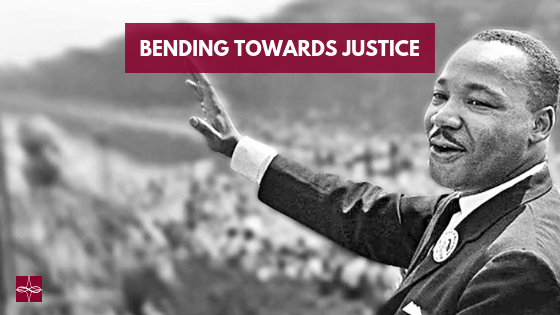

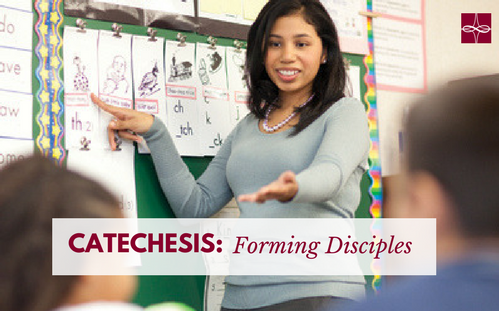


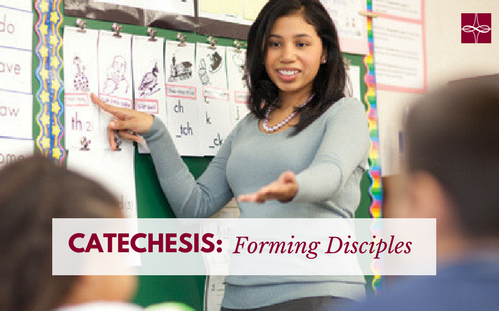

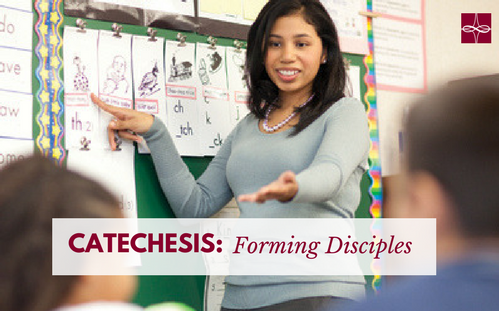





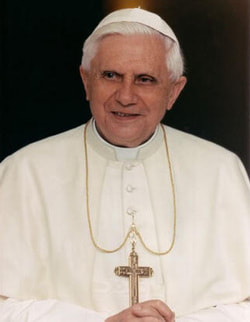
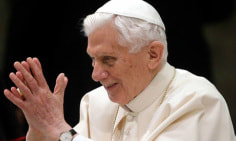
 RSS Feed
RSS Feed